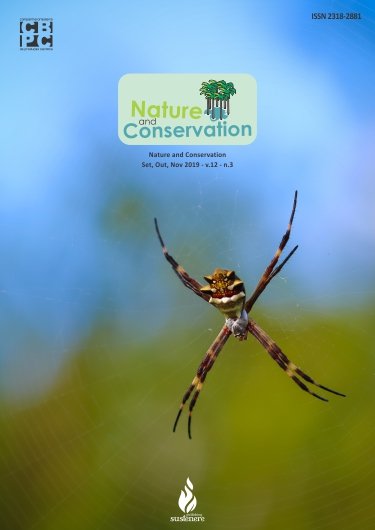The applicability of manure from organic biofertilizer composting process for sustainable agriculture
DOI:
https://doi.org/10.6008/CBPC2318-2881.2019.003.0005Keywords:
Germination, Organic waste, ToxicityAbstract
The objective of this study was to evaluate the efficiency of manure from organic waste composting process, in different percentages, in the irrigation of three different crops: Georgian Cabbage (Brassica oleracea var. Acephala), Malagueta Pepper (Capsicum frutescens' Malagueta) ') and beans (Phaseolus vulgaris). The mounting of the windrow took place at the CEUMA University Environmental Practices Laboratory. The experimental period was from March 16 to May 16, 2018, lasting 60 days, based on Góes et al. (2011) adapted. In all, 33 treatments were performed and organized as follows for each culture: T1 - 100% H2O; T2 - 10% slurry; T3 - 20% manure; T4 - 30% manure; T5 - 40% manure; T5 - 50% manure; T6 - 60% of manure; T7 - 70% manure; T8 - 80% manure; T9 - 90% manure; T10 - 100% manure. The soil used to plant the crops had the physicochemical parameters analyzed in the Physics Laboratory of the State University of Maranhão - UEMA, following the methodology of EMBRAPA, 2017. The physicochemical and microbiological analyzes of the slurry were performed by the laboratory ACQUA, according to Standard Methods for the Examination of Water and Wastewater 22nd edition, 5210 B. The highest growth and germination rates were obtained in the substrates: T1; T2; T3; T4 and T5 (40%) in bean, cabbage and pepper seeds. Thus, the slurry can be used as biofertilizer in the different cultures tested, because it up to 40% concentration, caused a significant growth of the vegetative structures of the tested varieties. This is corroborated with the high concentrations of BOD and COD, because the soil sprayed with the slurry retained the organic matter present in the compost, thus transmitting these nutrients to the plants, which caused their biological maturation.
Downloads
Downloads
Published
Issue
Section
License
The CBPC - Companhia Brasileira de Produção Científica (Brazil CNPJ: 11.221.422/0001-03) the material rights of the published works. The rights relate to the publication of the work anywhere in the world, including rights to renewals, expansions and dissemination of the contribution, as well as other subsidiary rights. All electronically published works may subsequently be published in printed collections under the coordination of this company and / or its partners. The authors preserve the copyright, but are not allowed to publish the contribution in another medium, printed or digital, in Portuguese or in translation.









